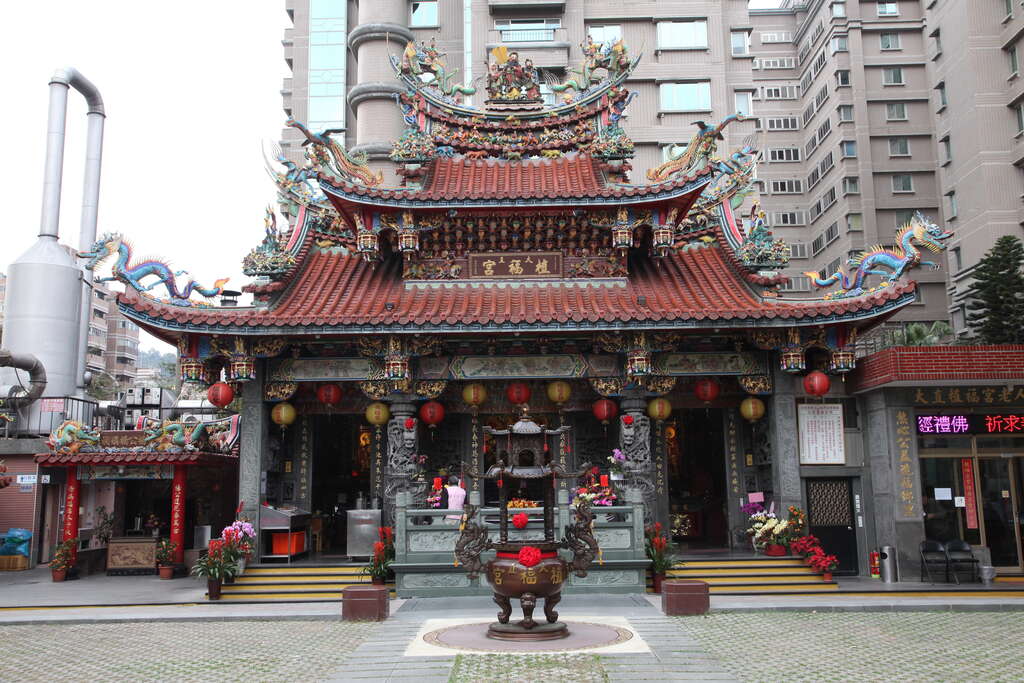Dazhi Zhi Fu Temple Introduction
Dazhi Zhipufeng Temple is the spiritual belief center for residents in the Dazhi area (including Zhongshan District, Neihu District, and Shilin District), and it is also one of the international tourist temple architecture and cultural attractions. Dazhi Zhipufeng Temple has a history of over 200 years and is dedicated to the Taoist deity "Fude Zhengshen" as the main god, following the system and spirit of Taoist temples, enshrining supplementary deities to promote Taoist teachings, establish genuine faith among the people, guide hearts towards goodness, purify society, and promote traditional cultural morals as well as carry out social charitable works. Additionally, Dazhi Zhipufeng Temple also worships deities such as Guanyin, the Heavenly Mother, Bao Yi Da Fu, Baosheng Dadi, Wenchang Dijun, Guan Sheng Dijun, and the Five Lords (Wang Ye Gong). Throughout the year, the temple provides faithful believers with various lights for blessings, peace, prosperity, and wisdom. Key dates include: - The first day of the lunar new year: Eleven fifteen PM, first incense offering, blessings, and divine grace. - The tenth day of the lunar new year: Lighting ceremony and offering for the "Annual Tai Sui Star Lord," peace lamp, bright lamp, Wenchang lamp, and prosperity lamp for blessings. - The fifteenth day of the lunar new year: Heavenly Officer's birthday, "Praying for Safety and Blessings Ceremony." - The second day of the second month: Fude Zhengshen's birthday, celebrating "Land God’s Birthday Celebration" event. - The third day of the second month: Wenchang Dijun's birthday. - The nineteenth day of the second month: Guanyin's birthday. - The fifteenth day of the third month: Baosheng Dadi Wu Zhenren's birthday. - The thirty-third day of the third month: Heavenly Mother’s birthday, "Praying for Safety and Blessings Ceremony." - The tenth day of the fourth month: Bao Yi Da Fu Zhang Xun's birthday. - The seventeenth day of the fourth month: Anniversary of the Dazhi land readjustment and temple establishment. - The sixth day of the fourth month: Five Lords Li Wang Ye's birthday. - The seventh day of the fourth month: Five Lords Fan Wang Ye's birthday. - The fifteenth day of the sixth month: Five Lords Chi Wang Ye's birthday. - The nineteenth day of the sixth month: Guanyin's enlightenment celebration. - The fourth day of the sixth month: Guan Sheng Dijun’s birthday. - The eighteenth day of the seventh month: Mid-year praise "General Offering Ceremony." - The nineteenth day of the seventh month: Annual Tai Sui Star Lord's birthday. - The fifteenth day of the eighth month: Land God’s enlightenment and the Five Lords Zhu Wang Ye's birthday. - The sixteenth day of the eighth month: Longevity Association's gathering. Activities for Mid-Autumn Festival starting from the thirteenth day of the month. - The fifteenth day of the ninth month: Five Lords Wu Wang Ye's birthday. - The fifteenth day of the tenth month: Shui Guan Da Di's birthday, "Praying for Safety and Blessings Ceremony." - The twenty-second day of the twelfth month: Year-end lamp-off celebration, completion of merits. - On the second and sixteenth days of each month: Chanting and prayer ceremonies for blessings. (Source: Dazhi Zhipufeng Temple)

























